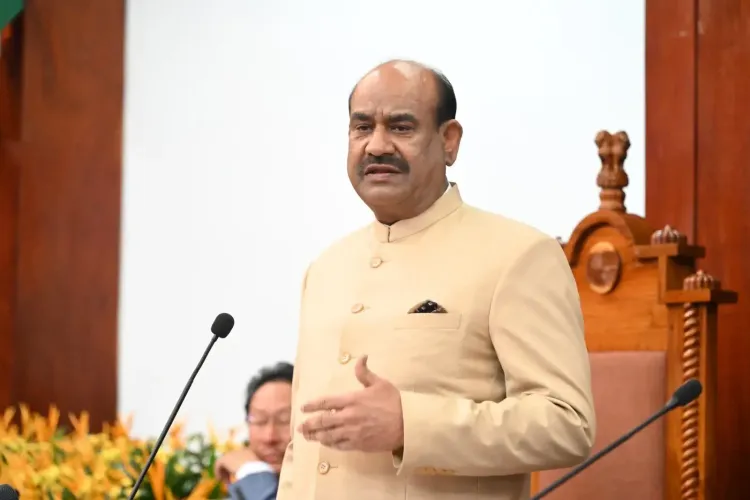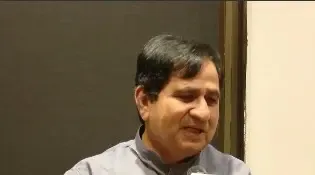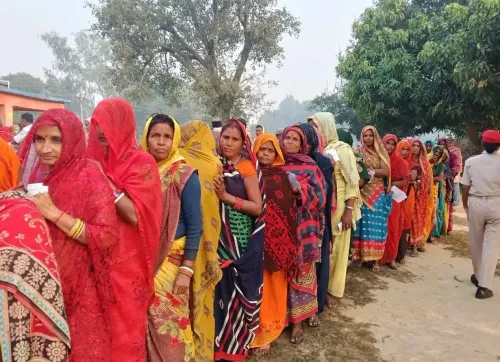How does LS Speaker Birla commend democratic traditions for minimal Assembly disruptions?

Synopsis
Key Takeaways
- Strong democratic traditions contribute to minimal Assembly disruptions.
- Emphasis on paperless governance in the Northeastern region.
- Call for policies that support regional development and cultural preservation.
- Importance of collaborative dialogue among policymakers.
- Significant proposals for infrastructure and educational improvements.
Kohima, Nov 10 (NationPress) Lok Sabha Speaker Om Birla expressed his contentment on Monday regarding the minimal disruptions in Assembly sessions, attributing this stability to the robust democratic culture and effective legislative practices prevalent among the states.
During his address at the 22nd Annual Commonwealth Parliamentary Association (CPA), India Region, Zone -III Conference Plenary inaugural session in Kohima, he emphasized the significant progress made, noting that many Legislative Assemblies in the Northeastern region have transitioned to a paperless system. This shift embraces modern technologies and artificial intelligence, aiming to improve accountability and transparency in governance.
Speaker Birla praised the Northeastern region for its swift advancements in connectivity and infrastructure, stating that with each new initiative, new opportunities for growth arise.
He encouraged policymakers to create programs that support regional development and industrial growth, while also promoting local arts, culture, and traditional crafts to gain both national and global recognition.
The conference's theme, “Policy, Progress & People: Legislatures as catalysts of change”, highlights the essential role of legislative bodies in driving transformation.
“The people of the Northeast are dynamic, hardworking, and possess immense potential,” Speaker Birla remarked, emphasizing their right to greater opportunities for self-actualization. Through collaborative dialogue and public engagement, legislatures can develop policies that ensure inclusive and sustainable growth.
He expressed optimism that the two-day conference at the Nagaland Assembly would foster significant discussions, paving the way for a tangible roadmap to enhance the efficiency and responsiveness of legislative institutions to the aspirations of the populace.
Reflecting on the historical significance, he noted that Nagaland hosted the first CPA Zone-III conference in 1997, making this year the third occasion for the state to welcome this esteemed event.
Birla acknowledged Zone-III of the CPA as one of the most active regions, consistently organizing conferences across various state Assemblies in the Northeast.
“Such gatherings offer invaluable chances for discussions within legislative bodies, significantly contributing to their capacity building,” he noted.
He highlighted that CPA conferences act as platforms for deliberating on development issues, public expectations, and aspirations, enabling participants to exchange best practices and fortify democratic institutions.
Addressing the conference theme, he remarked that it embodies the fundamental philosophy and values of democracy.
Speaker Birla acknowledged that the Legislative Assemblies in the Northeastern states have historically collaborated in a spirit of unity, crafting policies customized to regional needs that foster prosperity and advancement.
Nagaland Chief Minister Neiphiu Rio, speaking at the inaugural session, called for enhanced cooperation among Northeastern states to bolster democratic institutions, encourage regional growth, and support inclusive development.
He commended the legacy of the North Eastern Regional Commonwealth Parliamentary Association (NERCPA) formed in 1996, praising its contribution to mutual learning, unity, and policy collaboration among the eight Northeastern states.
CM Rio advocated for the Northeast's integration into the 'India–ASEAN Vision for Trade and Cooperation', urging for expedited infrastructure development, improved connectivity, and cultural exchanges to strengthen people-to-people relations throughout the region.
Regarding state development, he expressed concern that despite Nagaland's rich mineral resources, it remains resource-constrained due to insufficient exploration and infrastructure.
He reiterated his plea to the Central government for the swift establishment of an Indian Institute of Science Education and Research (IISER) and the upgrading of the Nagaland Institute of Medical Science and Research into an AIIMS-like institution to enhance education and healthcare.
Additionally, he urged the Centre to prioritize the proposed Dimapur–Tizit railway line and reconsider the Ciethu Airport project in Kohima, both crucial for economic growth and connectivity.
CM Rio lamented that Nagaland lacks national-level institutions such as an IIT or National Law University, which he believes are vital for retaining talent and fostering innovation.
He also pointed to the negative impact of the reintroduction of the Protected Area Permit on investments in the state, calling for focused efforts to address challenges related to connectivity, education, and institutional development.
Rio expressed confidence that the discussions at the conference would reinforce democratic institutions, enhance regional collaboration, and significantly contribute to the advancement of the Northeastern states.
Rajya Sabha Deputy Chairman Harivansh Narayan Singh acknowledged the region's rich diversity and the warmth of its people, extending early congratulations to the people of Nagaland for their upcoming 63rd foundation day to be celebrated on December 1, 2025.
He noted that Northeast India encompasses 4% of the nation's population and 8% of its area, and with a commitment to allocate 10% of the national budget for the region, he is confident that Nagaland and other northeastern states will emerge as economically vibrant hubs for trade and connectivity.
He also mentioned that the Northeast region will play a significant role in this process, creating more jobs and opportunities, and expressed hope that the legislature and government would facilitate the necessary laws and policies to capitalize on these prospects.
He urged pride in every community and tribe, highlighting their unique practices that reflect a symbiotic relationship with the environment. With approximately 650 indigenous species of medicinal and aromatic plants and 46 species of bamboo, Nagaland has vast potential for economic benefits while maintaining ecological balance.
He pointed out that in recent years, state governments, with the support of the Union Ministry of DoNER, have promoted organic products and recognized local handloom with GI tags. He expressed hope that the coffee produced in Nagaland would gain international acclaim, and that the chillies and shawls would also achieve wider recognition and demand in both domestic and global markets in the future.








